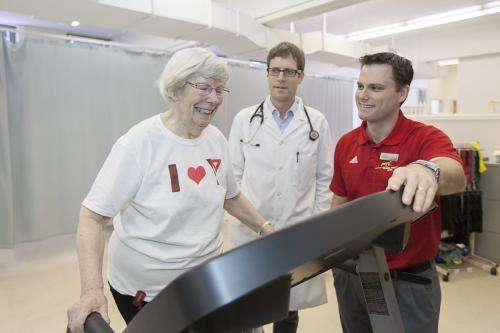Cancer survivor Pat Bogstad works with Chris Booth (center) and physiotherapist Michael Ranger.
A unique trial at Queen's University could improve the survival rate of patients with colon cancer. This is the first study to test if exercise can improve the cure rate of colon cancer and improve quality of life and physical function.
The study, called CHALLENGE, is led by the NCIC Clinical Trials Group at Queen's, and is currently underway at 46 cancer centres in Canada and Australia. It will soon expand to the United States and Israel.
"Our ultimate goal is to improve the survival and quality of life of patients with cancer," says lead investigator Christopher Booth, associate professor at Queen's University and medical oncologist at Kingston General Hospital. "As this will be the first and largest clinical trial to evaluate exercise in this setting, we also hope that the CHALLENGE trial will serve as a 'trailblazer' for other future studies of exercise and nutrition in patients with cancer."
Currently, there are about 300 patients enrolled and the trial aims to recruit 962 patients.
Patients in this study have already had surgery to remove their colon cancer and completed six months of chemotherapy. Standard practice is to follow these patients closely for the next three years with CT scans and blood tests to monitor for evidence of cancer recurrence.
In this trial, patients are randomized to either the "standard arm," in which they receive usual care and a book that encourages them to exercise, or the "intervention arm," in which they undergo the same tests but are also provided with a physical activity consultant (PAC). The PAC works with the patient to develop an exercise prescription that takes into account the patient's lifestyle, work schedule, previous exercise experience and preferences.
If the CHALLENGE trial finds that physical activity improves cancer survival, it could lead to a shift in practice and policy whereby an exercise program is considered part of standard treatment to be used in conjunction with surgery and chemotherapy. The PACs would become part of the cancer treatment team together with nurses, oncologists, social workers, dieticians and other health professionals.
"Our hope is that regular exercise will improve survival and quality of life for patients with cancer. If the trial can be completed successfully, it will also encourage other international studies of the effects of diet and exercise in the health of cancer survivors," says Dr. Booth.
Provided by Queen's University


















